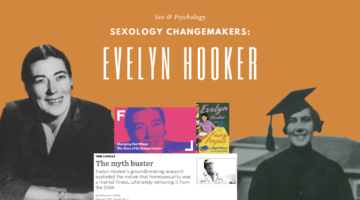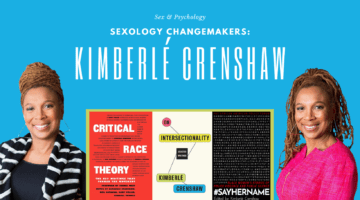So You Want To Be A Science Blogger? Here’s What You Need To Know
November 9, 2018 by Justin Lehmiller

I’ve been running the Sex and Psychology blog for nearly 7 (!) years at this point. When I started, I didn’t know a whole lot about blogging. I gradually picked it up over time, but it definitely took a while to find my stride. As you might imagine, I learned a lot about the dos and don’ts of blogging on sex science (and science more broadly) along the way. I’m often asked for writing advice by people who are new to this, so if you’re thinking about becoming a science blogger, here are some of the key things I’ve learned so far:
1.) The first paragraph is the hardest to write—and it will probably take you the longest. When writing a new post, the first paragraph is the one I always struggle with the most. Those first few sentences are the key to hooking the reader. You need to give them a reason to read beyond that, and it’s pretty challenging to do this, which is why I find myself constantly writing and rewriting introductions. It’s so important to take your time in setting up the piece appropriately because if it lacks a “hook,” you’ve just lost a lot of readers. Also, if you set it up right, I find that the rest of the piece writes itself very quickly because the scope and structure of it are clearly identified. The key question to answer for the reader in your introduction is: Why should I care about this?
2.) Be choosy when deciding which studies to blog about—and stick to your expertise. In my early days of blogging, I had a couple of nightmare experiences where I decided to blog about a long, dense paper that presented 4-5 studies and had very complex statistical analyses. While these papers undoubtedly made an important scientific contribution, I found that they were very, very hard to blog about, especially being new to this. It took a long time to read and understand the science and then figure out how to explain it to the average person. This isn’t to say that you should avoid blogging about complex studies altogether—just that you might want to wait until you have a bit more experience under your belt before you try. Also, it’s important to stick to blogging in your area of expertise. When you start blogging about research that offers an interesting conclusion but you don’t really understand the science behind it, you run the risk of getting the story wrong, which has the potential to harm your reputation in the long run.
3.) Assume nothing. Chances are that your audience won’t have the same level of scientific expertise as you, so you need to be very careful to avoid relying on technical terms and jargon in your posts. It’s OK to use them as long as you explain what they are, but don’t assume that people will know what you mean by terms like “extradyadic sex” or “copulatory vocalizations” (incidentally, here’s a guide to deciphering sex research jargon I created if you aren’t familiar with these terms). Your audience will stop reading very quickly if they don’t know what you’re talking about.
4.) Avoid the temptation to oversell the findings in the headline. Aside from the opening paragraph, the next hardest part of a blog post to write is the header. Most people will only see the headline and nothing else, so you need to try and draw the reader in with those words. This is where it’s tempting to “upsell” the results in the hope that more people will read your article—but that’s not what you want to do. If you’re a science blogger, your commitment should be to reporting the research accurately, not to getting the most clicks. When you veer into sensationalism, you not only begin to misinform the public, but you also start hurting your own reputation amongst your colleagues.
5.) Be sure to talk about what the research does NOT tell us.When blogging about the latest study, it’s tempting to focus only on the conclusions and takeaways—the new things it teaches us and how we can use that information going forward. However, every study has limitations, and there are things that research can’t or doesn’t tell us. So be sure to talk about the limitations and what we don’t yet know. Remember that every study that comes out isn’t an invitation for the reader to change their life, so don’t make things sound like they’re more definitive than they really are.
6.) Think carefully about WHY you want to blog before you start. What’s your goal in becoming a science blogger? To disseminate knowledge? To promote your own research? To improve your communication skills? To lay the basis for a career in non-academic writing? These are among the many perfectly good reasons to start blogging. However, if your goals are to become a “rock star scientist” or to make loads of money, think again. If you’re looking for fame and fortune, science blogging is a tough way to make a go of it—and if those are your goals, I worry that they may incentivize practices that reduce scientific integrity (like overselling the findings in the headline in an attempt to become more widely read and known). In my experience is takes a LONG time to build a following and there’s a ton of work that goes into it. For the last 7 years, I’ve been putting out 3 new blog posts per week religiously, but also sharing science on social media every day. It’s a huge commitment. It’s also very hard to monetize, especially when your content focuses on sex research because this will make you ineligible for a number of advertising opportunities. So make sure you’re in it for the right reasons and know what you’re getting yourself into.
Happy blogging!
Want to learn more about Sex and Psychology? Click here for previous articles or follow the blog on Facebook (facebook.com/psychologyofsex), Twitter (@JustinLehmiller), or Reddit (reddit.com/r/psychologyofsex) to receive updates.
Image Source: 123RF/twinsterphoto
You Might Also Like:

Dr. Justin Lehmiller
Founder & Owner of Sex and PsychologyDr. Justin Lehmiller is a social psychologist and Research Fellow at The Kinsey Institute. He runs the Sex and Psychology blog and podcast and is author of the popular book Tell Me What You Want. Dr. Lehmiller is an award-winning educator, and a prolific researcher who has published more than 50 academic works.
Read full bio >

